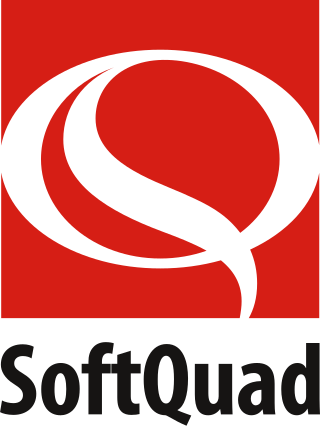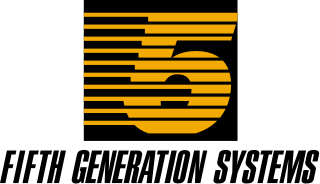
Gen Digital Inc. is a multinational software company co-headquartered in Tempe, Arizona and Prague, Czech Republic. The company provides cybersecurity software and services. Gen is a Fortune 500 company and a member of the S&P 500 stock-market index. The company also has development centers in Pune, Chennai and Bangalore. Its portfolio includes Norton, Avast, LifeLock, Avira, AVG, ReputationDefender, and CCleaner.
CodeWarrior is an integrated development environment (IDE) published by NXP Semiconductors for editing, compiling, and debugging software for several microcontrollers and microprocessors and digital signal controllers used in embedded systems.

GHOST, now called Symantec™ GHOST Solution Suite (GSS) for enterprise, is a disk cloning and backup tool originally developed by Murray Haszard in 1995 for Binary Research. The technology was bought in 1998 by Symantec.
B32 Business Basic was a competitor to Data General Business Basic written by Murray Haszard in 1986. It ran on the Data General Eclipse MV line of computers initially, and was ported to Unix in 1989 and to DOS in 1991.

Murray Hayden Haszard is a New Zealand entrepreneur and businessman who founded the companies B32 Software and Binary Research and is the chairman of Ilion Technology.
Norton AntiVirus is an anti-virus or anti-malware software product founded by Peter Norton, developed and distributed by Symantec since 1990 as part of its Norton family of computer security products. It uses signatures and heuristics to identify viruses. Other features included in it are e-mail spam filtering and phishing protection.
Norton GoBack is a disk utility for Microsoft Windows that can record up to 8 GB of disk changes. When the filesystem is idle for a few seconds, it marks these as "safe points". The product allows the disk drive to be restored to any point within the available history. It also allows older versions of files to be restored, and previous versions of the whole disk to be browsed. Depending on disk activity, the typical history might cover a few hours to a few days.

PC Tools is a collection of software utilities for DOS developed by Central Point Software.

Norton SystemWorks is a discontinued utility software suite by Symantec Corp. It integrates three of Symantec's most popular products – Norton Utilities, Norton CrashGuard and Norton AntiVirus – into one program designed to simplify solving common PC issues. Backup software was added later to high-end editions. SystemWorks was innovative in that it combined several applications into an all-in-one software for managing computer health, thus saving significant costs and time often spent on using different unrelated programs. SystemWorks, which was introduced in 1998 has since inspired a host of competitors such as iolo System Mechanic, McAfee Nuts And Bolts, Badosoft First Aid and many others.
Drive Image (PQDI) is a software disk cloning package for x86-based computers. The software was developed and distributed by the former PowerQuest Corporation, beginning in 1997. It runs under MS-DOS and Microsoft Windows environment.
Wise Solutions, Inc. started by John McMillan and Brien Witkowski was an American company that made software tools for creating application installers. Their primary product, Wise was one of the most widely used installation packages for Windows. Their main competitor was InstallShield by Flexera Software. Wise Solutions was acquired and became a wholly owned subsidiary of Altiris, Inc. in December 2003. In April 2007, Altiris was acquired by Symantec Corporation.
Q&A was a database and word processing software program for IBM PC–compatible computers published by Symantec and partners from 1985 to 1998. It was written by a team headed by Symantec founder Dr. Gary Hendrix, Denis Coleman, and Gordon Eubanks.

SoftQuad Software, Ltd., was a Canadian software company best known for HoTMetaL, the first commercial HTML editor. It is also known for Author/Editor, the first specialized SGML editor, and Panorama, the first browser plugin for SGML. Panorama demonstrated the need for standardization of SGML on the web, which eventually resulted in the development of the XML specification.

Symantec Endpoint Protection, developed by Broadcom Inc., is a security software suite that consists of anti-malware, intrusion prevention and firewall features for server and desktop computers.

Fifth Generation Systems, Inc., was a computer security company founded October 1984 in Baton Rouge, Louisiana, United States by Robert Mitchell, Leroy Mitchell, Roger Ivey, and Bruce Ray. All four later left the company after it was acquired by Barry Bellue who was accused by the founders of fraud and continued theft from company accounts for illegal personal use. Fifth Generation's initial commercial product was FastBack, an early competitor to The Norton Backup from Symantec.
Laplink PCmover is a PC migration software developed by Laplink Software. Introduced in 2005, as the successor to Laplink, PCmover comes in a variety of versions that provide the ability to move or restore all selected files, folders, settings, user profiles and programs from an old PC to a new one, an old operating system to a new one, or an old hard drive to a new one. Microsoft has partnered with Laplink on multiple occasions and recommends PCmover for automatically moving programs, files and profile setting to new Windows 10 PCs.

Blue Coat Systems, Inc., was a company that provided hardware, software, and services designed for cybersecurity and network management. In 2016 it was acquired by and folded into Symantec and in 2019 as part of Symantec’s Enterprise Security business it was sold to Broadcom.
Synex Systems Corporation, a subsidiary of Synex International Inc., was formed in 1983 in an effort to develop software for the microcomputer market and was run by Synex International Vice President Murray Hendren until 1992. In 2002, Synex Systems was acquired by privately owned Lasata Software of Perth, Australia. In 2005, Lasata was acquired by UK based Systems Union. In 2007, Systems Union was acquired by privately held Infor Global Solutions, a U.S. company that specializes in enterprise software.
The information and communications technology industry in New Zealand is a rapidly growing sector. The technology sector overall employs over 120,000 people, and technology is New Zealand's third largest export sector, accounting for $8.7 billion of exports, with information technology creating 50,000 full time jobs, and about $1 billion in IT services exports.
Thomas Koll is a technology business executive and chairman and CEO of Laplink Software, a provider of PC migration software based in Bellevue, Washington. Before joining Laplink in 2003, Koll served as chairman and CEO of Infowave Software and vice president of Microsoft's Network Solutions Group. He also was an author and publisher in his home country of Germany.







